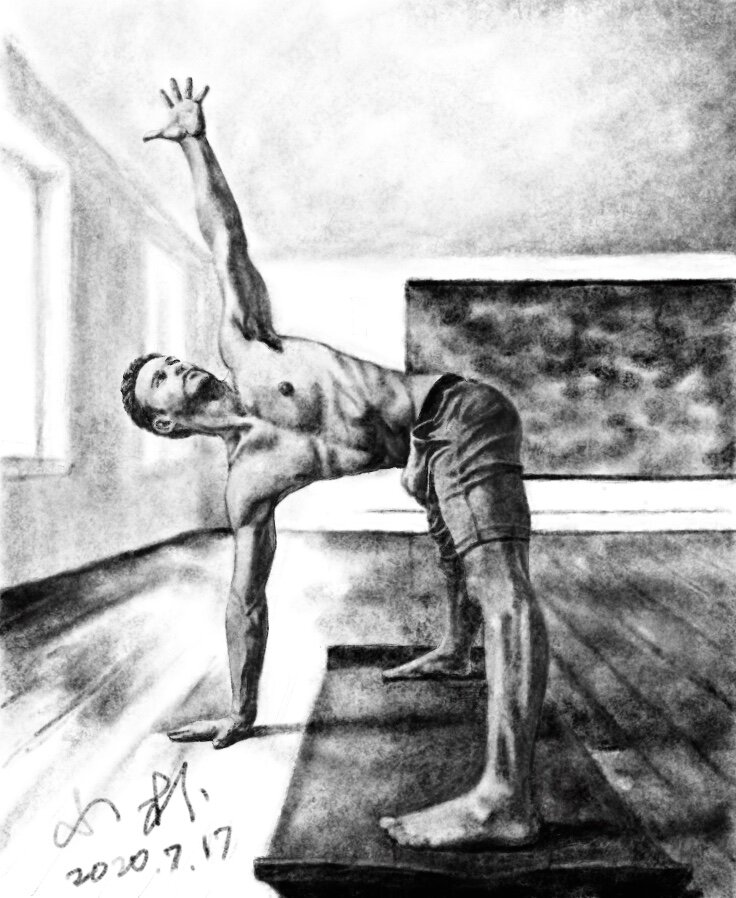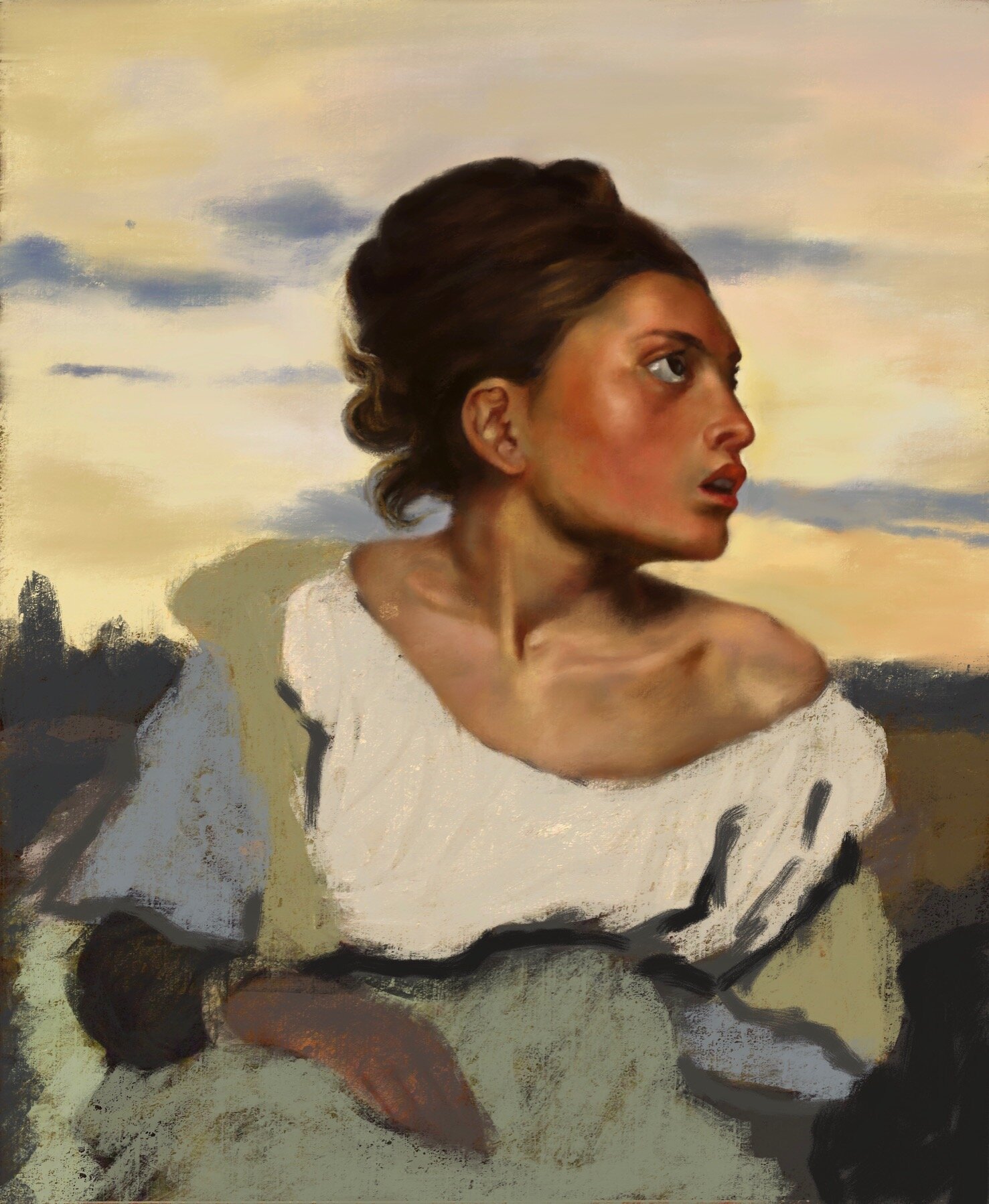Simon Li (李小朴 Li Xiao Pu)
Mary Taylor
Working for a big television production company was like a dream come true for Simon Li, who’d been drawn to writing, painting and the wild realms of mythology since childhood. And it started out well. He worked on important projects with other professionals and began building a career within the field. But over time as his workload increased and responsibilities grew, his lifelong passion for the arts began to dwindle. Stifled by the relentless pressure of the job and feeling he had to set his own creativity aside in order to meet the vision of others, Simon became burned out; alienated in the very world he thought he’d thrive in and love. He sank into a seemingly constant state of feeling weak, filled with anxiety and depression. But he pressed on.
Then one day by chance, he walked into a store and heard a familiar voice. Looking up he saw a video playing in a loop. It was of a woman he’d seen as a child teaching yoga on TV. Halfheartedly Simon bought the video and a few days later watched it. Slowly over the next month or so he began practicing a little yoga along with the video—not much at first, and then with more and more regularity. His anxiety and depression began to shift and after a while he actually looked forward to practicing. Eventually he found a teacher at a local gym to study with in person and some time later began taking workshops and leaning about aspects of yoga that go beyond just the physical aspects of practice.
Asana practice is what helped Simon the most at first, but not too long after he became fascinated by the focus on the breath. Bringing awareness to the process of breathing—something that had been there all along, but that he’d never really paid attention to—deepened his asana practice, but also made him wonder, “If I’d been unaware of something so central to existence as the breath, what else was I missing?” Focusing on the breath revealed to him all kinds of secrets he’d never imagined about the nature of his breath. These insights inspired him to look into other aspects of life with sharpened awareness as well and he became intrigued by the idea of paradox. Before he began practicing yoga when he would become absorbed by one thing he would block out everything else—especially the opposite of whatever it was he was focusing on. But learning to be attentive to the wave patterns of movement, breath, emotion and mind, helped him see the value of paradox. Through yoga, in particular breathing, philosophy and Indian mythology, Simon feels he’s learned to embrace paradox rather than block it out and that this has made life much easier. The ability to not see in black and white or to become uncomfortable with paradox now informs his art and his life as a whole. And this shift in perspective traces back to the breath. “The breath is like a retreat,” he says. “It’s shared by everyone, but it’s also just mine as well, so I can count on it when self doubt or creative doubt arises.”
Mary, Simon and Richard
Simon recalls that there was a period when he first started practicing that he idealized yoga as if it must be a solution to everything because it helped him out of depression. But then he became disappointed seeing people who’d been practicing for years still sometimes struggling. Luckily he didn’t toss in the towel on yoga in dismay, but continued to practice and after a while came to appreciate that suffering is a reality of life and that struggle is, in some ways beautiful, though it can be painful when you’re in it!
Eventually Simon quit his job with the television production company to pursue the depths of his connection to life through his creative drive and the arts. I caught up with him recently in his hometown of Huhhot, the capital of Inner Mongolia in northern China. Huhhot, which means “Green City” in Mongolian, like most cosmopolitan areas of China is growing and changing quickly. Today there are close to 3,000,000 people living there, yet still its character remains rooted in traditional Mongol culture and interestingly, there are many practitioners of Tibetan Buddhism in Huhhot as well.
“Yoga created a platform, like a hub, that connects everything. All my interests, creative passions, all my curiosity connects to yoga and in turn, yoga connects everything together.”
Like so many of us whose life has been turned upside down by the events of the last year and the pandemic, Simon’s has too. He had come for a visit to Huhhot in January from Crete, where he was planning to live. Suddenly the COVID outbreak happened. So he’s waiting things out until it is possible to return to Crete. In the meantime, the unexpected space and time is inspiring him to cultivate his passion for the arts. Simon is working on writing a play, and also a novel. He sees writing as a way of communicating, of building bridges between things and as a means of piecing ideas together in ways that ultimately create something unexpected and new. This is especially true when he’s translating (which he does as well) because there’s a demand to express innuendos and deeper thoughts in words and with ideas that overcome cultural differences so as not to loose the essence of what is being said.
During these last few months Simon has also been drawn back into and has been experimenting with graphic art—learning to apply painting techniques he’s worked with for years to digital art. He says that yoga has informed his painting by giving him a new level of understanding of the human body and its relation to space. These images are some he’s been experimenting with.
I asked Simon to recommend a favorite book or movie and after some thought he came back to me with these:
“The Secret of Golden Flower” by Carl Jung. This insightful book is an interpretation of Chinese Taoism and other Eastern philosophies from a Western psychoanalyst’s perspective. For Simon it has enriched his meditation practice because by allowing him to feel less bound by a diachronic mindset.
“Paterson” directed by Jim Jarmusch reveals the poetic sense of mundane life. It’s just like the yoga experience. You’re not trying to make things more divine or poetic, you just discover it as it is.
Chinese name 李小朴 Li Xiao Pu. The pronunciation of X does not exist in English, it’s an aspirated sound made while putting the tip of the tongue behind your lower teeth.




